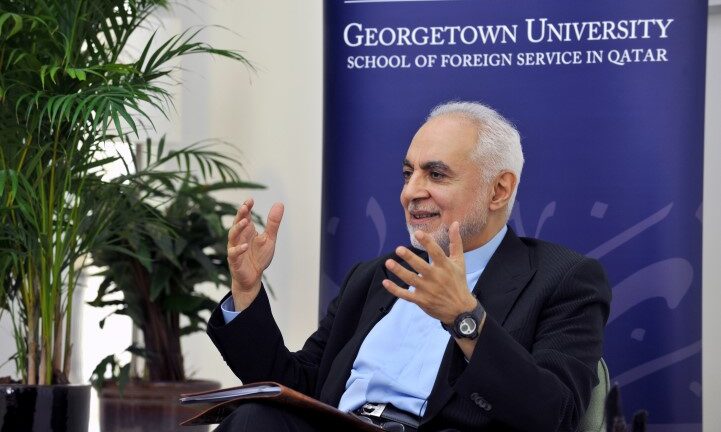Dialogue Series, Distingushed Lectures, Race & Society, Regional Studies
Imam Feisal Lectures on Moderate Islam

Imam Feisal Abdul Rauf, a prominent Muslim leader in the United States and Chairman of the Cordoba Initiative, visited Qatar during a trip to the region sponsored by the U.S. Department of State. He was invited to the Georgetown University in Qatar campus on August 24, 2010, to talk about “Moderate Islam, the Muslim Community in America, and Inter-Faith Dialogue.” Mehran Kamrava, Interim Dean of GU-Qatar, introduced the Imam as a “peace-builder” and welcomed the audience “in the spirit of dialogue, discussion, and discourse;” pillars of Georgetown University’s mission in Washington, DC, and Qatar.
The Imam said that the Cordoba Initiative was a means of bridging U.S.-Muslim relations. He noted that a major initial task was to unpack these binary oppositional terms to reveal complexities at the heart of the problem between the “West” and the “Muslim world.” The “West,” he said, is much more than a geographical location; it is a political and ideological projection that has very real and long-lasting impacts on the world. As such, “bridging the divide between Islam and the West involves unpacking the sources of the problem, and looking at the opportunities that can be made.” The Imam argued that there is a misperception that Islam-West relations will take generations to fix, but, he said, “I am convinced that the so-called tension and polarization between the West as the United States, or the West at large and the Muslim world, can be fixed in a ten-year time-span if there is the will to do it and the resources put behind it.”
The causes of the divide can be analyzed in different ways, but the Imam identified four basic sources of the problem. The first of these is rooted in global political conflicts such as Israel-Palestine, U.S.-Iran relations, and the presence of U.S. troops in Afghanistan and Iraq. The second revolves around a rapidly changing demographic occurring primarily in Europe, where Muslim populations are rapidly increasing. Imam Feisal argued that “because the native populations are declining, there is a sense that the identity make-up of the society is undergoing some permanent shift.” Thirdly, there are fundamental problems that arise as a result of theological interpretation and jurisprudence, where the West believes in secularism in direct opposition to how Muslim political communities are formed. Further, there are fundamental differences related to gender relations. These issues present challenges in the United States as well as Europe. Fourthly, the Imam argued that there are general misrepresentations of the ‘other.’ “The perception of each side is another issue where the media plays a profound role.” In the interest of a perceived fairness, the media usually polarizes issues further by insisting on two opposing sides to each issue. Not only this, the media – both the news and entertainment media – also tends to emphasize negative factors that generate equally negative reactions among audiences.
In conclusion, in order to solve these divisive issues, Imam Feisal argued that the resolutions must be “context specific” and that there is an urgent “need to look at the architecture of power” as Muslims living in the United States need to improve their understanding regarding how the country is structured. Therefore, he argued “it is important to understand how decisions are made, and to be engaged in that process.”
Imam Feisal is the chairman of the Cordoba Initiative, an independent, non-partisan and multi-national project that works with state and non-state actors to improve Muslim-West relations. In this capacity, he directs projects that aim to heal conflict between Islamic and Western communities by developing youth leadership, empowering women, and engaging Islamic legal scholars in addressing the implications of contemporary Islamic governance. In 1997, he founded the American Society for Muslim Advancement (ASMA), the first Muslim organization committed to bringing American Muslims and non-Muslims together through programs in academia, policy, current affairs, and culture. As Imam of Masjid al-Farah, a mosque located twelve blocks from Ground Zero in New York City, he preaches a message of understanding between people of all creeds. Additionally, Imam Feisal sits on the Board of Trustees of the Islamic Center of New York and serves as an advisor to the Interfaith Center of New York.
Article by Suzi Mirgani, CIRS Publications Coordinator.